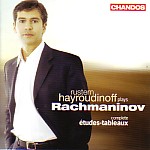Pianist Rustem Hayroudinoff’s technique and artistic temperament match Rachmaninov’s Etudes-Tableaux well. Textural clarity and control operates on a more refined and variegated level than in the pianist’s previous Rachmaninov release devoted to the Preludes. And while Hayroudinoff is not the most sensual colorist in this repertoire, the metallic, banging qualities that bothered me in the Preludes now give way to a richer, more focused sonority. On a purely musical level, Hayroudinoff doesn’t quite face up to the demonic undercurrents and unsettling accentuations that others brave in this repertoire (Ogdon’s complete 1971 cycle, individual performances from Richter and Horowitz, to name a few).
Slower selections could benefit from a stronger sense of pulse and narrative flow, such as in the C minor pieces Op. 33 No. 3 and Op. 39 No. 7. Moreover, the pianist hasn’t completely shed his habit of making small tempo adjustments that either impede the flow of counter-lines in complex textures or soften the impact of a climax. Op. 33 No. 5 (D minor) illustrates this point. By the same token, the Op. 39 No. 4 B minor’s sinewy profile and rhythmic snap and the same opus number’s powerfully projected grand finale carry tremendous authority. All things considered, collectors seeking both Etudes-Tableaux collections on a single disc can’t go wrong with the total professionalism and solidity Rustem Hayroudinoff offers here.
































